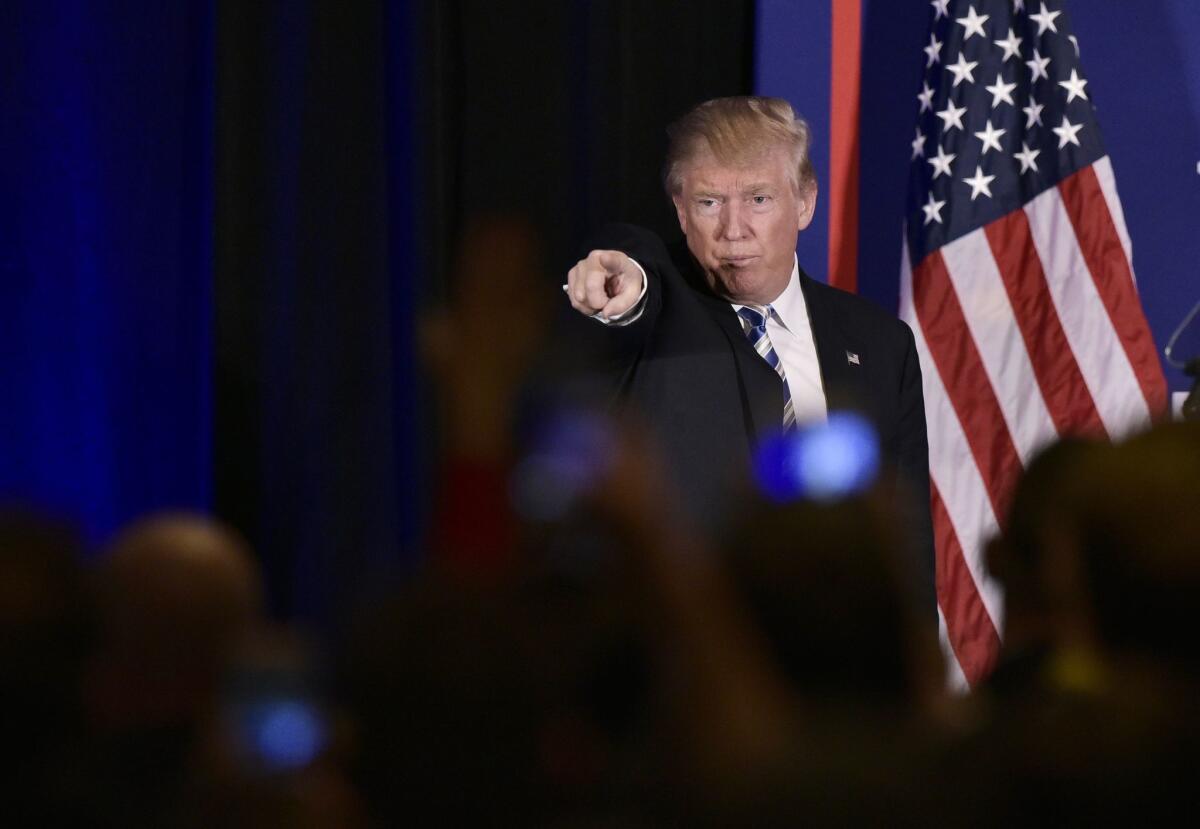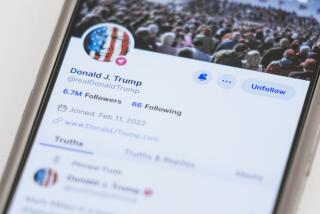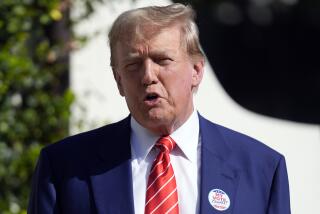Trump’s victory could threaten AT&T’s purchase of Time Warner

Republican Donald Trump ran a business-friendly presidential campaign, but he was anything but amiable toward AT&T Inc.’s proposed $85.4-billion purchase of Time Warner Inc. And his victory could spell big trouble for the deal.
As news of the mega-merger broke last month, Trump declared that it was “a deal we will not approve in my administration because it’s too much concentration of power in the hands of too few.”
With Trump poised to enter the White House in January, AT&T and Time Warner have a significant — although not insurmountable — hurdle to getting Washington’s blessing unless he changes his position.
“Given Trump’s campaign rhetoric and his distaste for Time Warner’s CNN division throughout the campaign, the odds of regulatory approval appear to have dropped,” Richard Greenfield, a media industry analyst with BTIG Research, wrote in the wake of the election.
Investors appeared to agree, given that regulatory approval already was a concern before the election.
AT&T shares dropped 2.3% on Thursday to $35.57. Time Warner stock was down 0.3% to $86.33.
The deal would transform telecommunications giant AT&T, which bought DirecTV last year, into the nation’s largest entertainment company. Time Warner would bring a stable of premium content, including HBO, CNN, TBS, TNT, Cartoon Network and the Warner Bros. TV and film studio.
Despite Trump’s vow to block the deal, AT&T’s Chief Financial Officer John J. Stephens didn’t indicate any worries after the election.
“From a company perspective, we really look forward to working with President-elect Trump and his transition team,” Stephens told an investor conference Wednesday.
AT&T is bullish on Justice Department approval, Stephens said, because of the history of regulatory reviews involving a “vertical integration” of companies that don’t directly compete against each other instead of a horizontal merger of rivals.
“In our industry, there is nothing that we can find on record of the DOJ ever denying one of these mergers,” Stephens said. “And quite frankly, there’s good reason for that because it brings consumer choice, it brings innovation and it will benefit consumers. So from that perspective, we’re optimistic.”
The deal also would require approval from the Federal Communications Commission if the companies decide to include Time Warner’s communications licenses in the deal. Time Warner has a broadcast TV station and several licenses to transmit video signals to satellites.
Stephens said the companies haven’t determined yet if the deal would include the licenses.
FCC approval had been viewed as difficult if Democrat Hillary Clinton had won the election and her party retained the majority on the commission.
But Trump will get to appoint a Republican to head the FCC after he takes office Jan. 20. Republicans generally have been much more friendly to industry mergers.
Andrew Jay Schwartzman, a Georgetown University law professor and expert on media industry regulation, said Trump’s victory means that AT&T and Time Warner would have less concern about an FCC review.
But until Trump makes appointments to the FCC and names a new attorney general, it’s too early to tell if the deal will be approved, Schwartzman said.
“A Trump Department of Justice, which is going to have a more pro-business view, may have a hard time coming up with a rationale to block that deal that wouldn’t undermine their broader philosophical goals,” he said.
Although the FCC can simply vote to stop a deal, the Justice Department must seek a court injunction to stop a merger. That requires a legal argument that can sway a judge or convince the companies to give up because they stand little chance of winning in court.
“This idea that [Trump] can unilaterally block it is false,” said Hal Singer, a senior fellow at George Washington University’s Regulatory Studies Center. “The question is: Is he willing to go through the motions in kind of a game of chicken?”
Trump’s tough talk on the deal might have been campaign rhetoric, or his view could be swayed by his attorney general and other advisors, Singer said.
Based on the mainstream conservatives Trump has on his transition team, “I think that he was not sincere” in his opposition to the deal, Singer said.
Although Trump is a billionaire real estate mogul who wants to cut business taxes, he ran a populist campaign and often railed against corporate power. He also charged that CNN and other media elites were trying to rig the election against him.
“As an example of the power structure I’m fighting, AT&T is buying Time Warner, and thus CNN, a deal we will not approve in my administration because it’s too much concentration of power in the hands of too few,” he told an Oct. 22 campaign crowd, which responded with applause.
He went on to complain about Comcast Corp.’s 2011 purchase of NBCUniversal.
“Deals like this destroy democracy and we’ll look at breaking that deal up and other deals like that,” Trump said. “This should never ever have been approved in the first place.”
Follow @JimPuzzanghera on Twitter
ALSO
Hiltzik: Despite Republican pledges, ‘repealing Obamacare’ will be almost impossible
Fear of a Trump-triggered recession gives way to hope for short-term economic boost
After Trump’s win, even some in Silicon Valley wonder: Has Facebook grown too influential?







